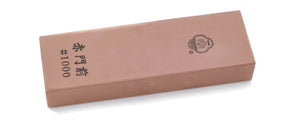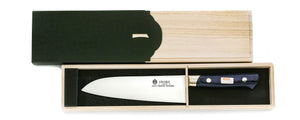6 Best Tips for Caring for Japanese Kitchen Knives
Japanese knives are known for their sharpness and precision, and they require special care to maintain their quality. Here are six tips for caring for Japanese knives:
1) Avoid Moving From Side to Side
Due to a knife blade's high level of hardness, they are prone to chipping and cracking. Avoid using a side to side motion when cutting.
Hard blades, such as those found in Japanese knives, are prone to chipping because they are more fragile than softer blades.
The hardness of the blade is achieved through a process of heating, quenching, and tempering the steel, which creates a fine-grained crystalline structure that is very hard and sharp.
While hard blades are more prone to chipping, they also have advantages such as better edge retention and sharper cutting ability. To minimize the risk of chipping, it's important to use the knife properly and avoid subjecting the blade to excessive force or impact. Thus, please avoid the motion that may make the blade chip such as moving the blade sideways or changing the angle while cutting into anything.
2) Less Up-Down, More Back-Forth
A knife's lifespan can be significantly extended by minimizing up-and-down cutting and instead using a back-and-forth movement.
As mentioned above, you should avoid impact to the blades because hard blades are more prone to chipping. Cutting by chopping may increase the risk of chipping. Therefore, you should cutting by moving the knife back and forth more than up and down.
Especially, "Mincing" is a common method of cutting in the West, but with Japanese knives, it puts too much stress on the blade and can cause chipping, so it is best to avoid it. If mincing or similar cutting techniques are required, be careful with the level of force you use so you don't chip your knife.
3) Avoid Frozen Food or Bones
Unless you have a specialized tool like a Deba or Frozen Food Knife, avoid using your knife on frozen or hard objects. This increases the chance of chipping.
Deba or Frozen Food Knives are special knives which are designed to be used in special cases. Deba is a Japanese traditional-style knife which is used for filleting fish. Its blade is relatively thick so it can be used for cutting fish heads and bones. Other Japanese knives are less designed for cutting hard or frozen objects. Those objects require a lot of force to cut through, which stresses the knife blade. This can cause the blade to chip or even break, which can render the knife unusable. Basically, the harder and more precision-treated a high-end knife is, the higher the risk of chipping due to impact or temperature changes.
In addition to damaging the blade of the knife, cutting hard or frozen objects can also be dangerous. When the knife blade encounters resistance while cutting through a hard object, it can slip or bounce off, potentially causing the user to lose control of the knife and injure themselves or others.
By using the right tool for the job and practicing good knife safety, you can keep your knives in good condition and avoid injury.
4) Use a Soft Cutting Board
Do not use cutting boards made of hard materials like hard plastic or walnut. The lifespan of the blade will be greatly increased by using a soft cutting board.
Soft cutting boards are less likely to damage the blade of the knife compared to hard cutting boards. When a knife blade strikes a hard surface, it can dull or chip the blade, which can reduce its effectiveness and lifespan. Soft cutting boards are more forgiving and are less likely to damage the blade, allowing the knife to maintain its sharpness and cutting ability over time.
Example of soft cutting boards : The cutting boards made of rubber, hinoki (Japanese cypress), soft plastic.
5) Do Not Use Dishwasher
High temperatures and tiny particles whirling about within the dishwasher can damage your knives. Please wash them by hand.
It is not recommended to wash knives in the dishwasher for several reasons.
Firstly, the high temperature and harsh detergents used in dishwashers can damage the blade of the knife. The heat and chemicals can cause the blade to warp, corrode, or become discolored, which can reduce its sharpness and lifespan.
Secondly, knives can rust or become dull when they come into contact with items and any particles whirling about in the dishwasher.
To properly care for your knives and extend their lifespan, it's recommended to wash them by hand. Use warm water and a mild detergent to gently clean the blade and handle. Dry the knife immediately after washing to prevent moisture from sitting on the blade and causing corrosion.
6) Wipe and Keep Dry
Be very careful of moisture. It will take less than a minute for rust to start forming on your knife.
High carbon steel knives can and do rust easily. Please wipe it after every time you use it. After washing, dry the knife immediately with a soft cloth. Do not air dry or leave the knife in a damp environment, as this can cause the blade to rust. Addtionally, to protect the blade from rust and corrosion, apply a small amount of oil to the blade after each use. Please use oil that does not dry out easily and does not affect food. We highly recommend camellia oil for this purpose. If you cannot find camellia oil, you also can use olive oil. Simply apply a thin layer of oil with a soft cloth or paper towel. Wrap the knife in newspaper, paper, or cloth, then store it in a dry place.































